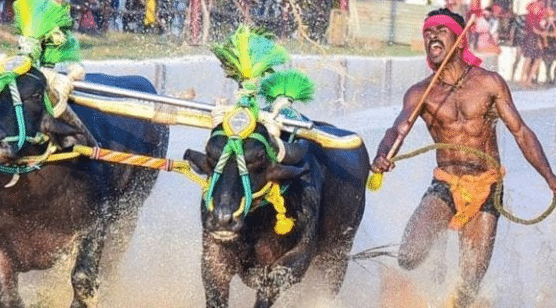Compared to the Jamaican champion, the 28-year-old worker is a Kambala champion. The local newspapers and Twitter are extolling him by publishing his photos. He covered 142.5 meters in 13.62 seconds. Bolt did his 100 meters in 9.58 seconds.
There’s a speedy worker in India. They compare him to the Jamaican Usain Bolt, former Olympic sprinter, gold medalist and world record holder of the 100 and 200 meters. Only Srinivas Gowda, 28 years old, runs with buffaloes through the rice fields. Kambala is a sport of the southern state of Karnataka, the course is 142.5 meters, and it is said that Gowda “burned” it in 13.62 seconds. Bolt set the record (on track) of the 100 meters in 9.58 seconds.
The Kambala Academy does not boast of Gowda’s exploits. “We would not wish to indulge in any comparison with others,” President K Gunapala Kadamba told BBC Hindi. “Those who monitor the Olympic events have scientific means and better electronic equipment to measure speed,” he added after several local newspapers had dared to compare Gowda’s performance with the world record time of the Jamaican sprinter.
Gowda, from Moodabidri, a coastal district of Karnataka in Dakshina Kannada, is happy with his time. Enough to praise his teammates: the two buffaloes that ran alongside him. He has been competing in Kambala for seven years: “I used to watch him as a child, during my school days. The Kambala season generally starts in November and lasts until March, over 45 races are held every year in coastal Karnataka, including small remote villages like Vandaru and Gulvadi. For three hundred years it has attracted large crowds of up to 200,000 spectators. People bet on buffaloes and watch by throwing eggs. In some places, night races are also held. The buffaloes that compete are well fed, and some animal owners breed and keep them with the utmost care.
The name of the discipline translates roughly into “field of mud growing in the rice paddies” in the local Tulu language. It is a traditional sport; the participants run in a field of 132 or 142 meters with two buffaloes tied together. This has raised a lot of criticism from animal rights activists over time. In 2014, the Indian Supreme Court issued a ban on bull racing, in 2016 the Karnataka State Court issued a provisional order to stop all events in Kambala, then readmitted in 2018 with a ban on the use of whips.
Professor Kadamba said that the organizing body is also updating the sport: athletes are taught how to face the buffalo “humanely, without damaging it”. In short, “this Kambala is very different from the traditional one of some decades ago”. But the practice is still in danger. The international group for animal rights Peta presented a petition to the Supreme Court, claiming that the restoration of Kambala in the Karnataka district was illegal.
“The Republic will always stand up for freedom of information, for its readers and for all those who care about the principles of democracy and civil coexistence.”

























